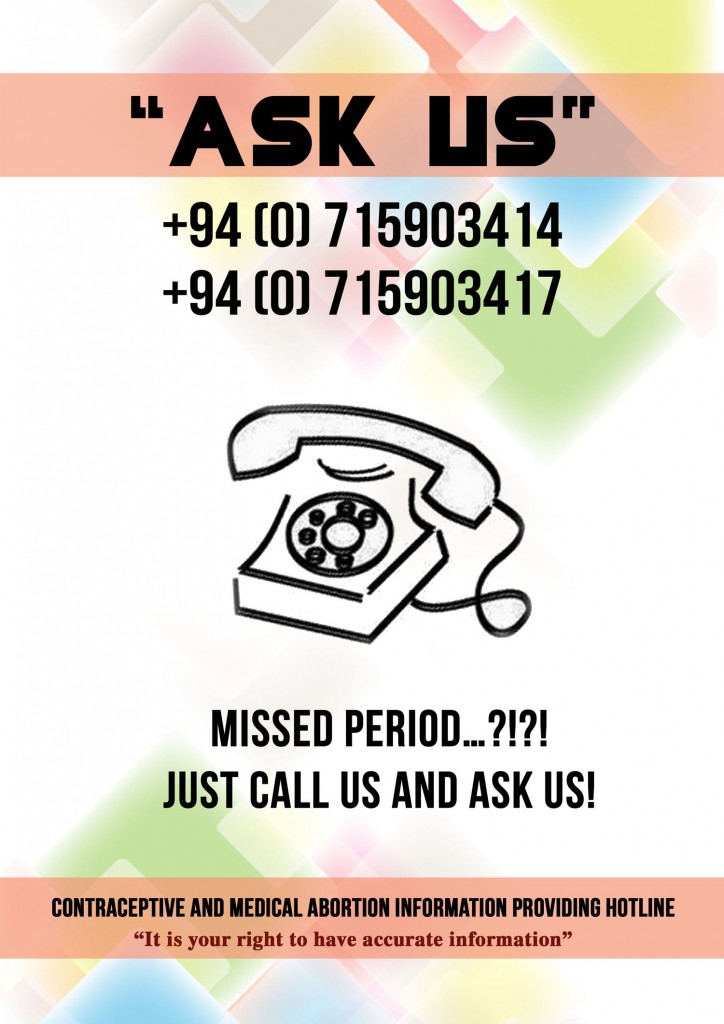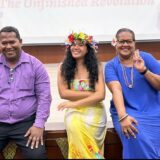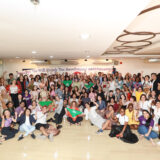Why do Sri Lankan women need access to safe, legal and affordable abortion services??
 In Sri Lanka, abortion is restricted and can only be accessed when the mother’s life is in danger. Yet in Sri Lanka Medical Research reports show that 700 – 1000 underground abortions take place daily. Most of them take place in unhygienic and unsafe conditions.
In Sri Lanka, abortion is restricted and can only be accessed when the mother’s life is in danger. Yet in Sri Lanka Medical Research reports show that 700 – 1000 underground abortions take place daily. Most of them take place in unhygienic and unsafe conditions.
There is no proper forum to discuss about adolescents sexualities. In schools there is no comprehensive sexuality education (CSE). Though there are some lessons teachers aren’t willing to teach comprehensively, therefore access to information on sexual and reproductive health is limited.
Reproductive rights of Sri Lankan women have been controlled almost forever. The law related to abortion hasn’t been revised since 1883. As a positive sign in 2011 a bill was drafted to legalize abortion in instances of rape, incest and fetal abnormalities which was prepared by Commission of Law in consultation with Ministry of Child Development and Women’s Affairs and Ministries of Health and Justice. If this bill was passed in parliament, it was to permit abortion under those circumstances if recommended by a panel of medical experts based at a government hospital. After much debate and because of cultural and religious barriers the bill failed.
Politicians, religious leaders, important stakeholders need to realize that every woman have a moral right to make choices regarding their bodies. They need to respect women’s choices and pay attention to make much broader legal and policy changes which urgently required addressing abortion which leads to unsafe abortions.
Even under restricted laws, specialized abortion services are somewhere accessible in Colombo and in other larger towns. But the issue is whether every woman who needs abortions can afford that kind of service. When these services are too costly women tend to look for less expensive alternatives which are not safe at all. It is only a few who are able to access information on medical abortion as well. Authorities for abortion do not yet approve even mifepristone and misoprostol; women have to buy the pills in black market or from pharmacies, which are very expensive. Though they are able to find and buy pills there is no proper platform where women can access information on medical abortion.
ASAP youth champions in Sri Lanka realized the need of access to information on medical abortion plus accurate information on contraceptives. Respecting the right to information activists launched “ASK US” a hotline which provides information on contraceptives and medical abortion. The callers are able to get accurate information under the guidelines of WHO and the hotline respects the choices of women by reminding them their options and by letting them take decisions about their own bodies themselves. Hotline has not only been providing information but has been giving psychological support for women and girls throughout. It was a difficult road to launch the hotline with so much of criticism and stigma regarding abortion. Even under so much of criticism the hotline has reached its’ 2nd month receiving more and more calls each day supporting and empowering women with needs and questions.
Did your friend, sister, daughter, girlfriend, wife or neighbor miss her period?! Don’t hesitate. Call us. Ask us! Be informed and make informed choices!






